

Another busy week for The English Apple Man
On Monday the Grand Opening of A.C.Goatham's new 'state of the art' Headquarters at Flanders Farm Ratcliffe Highway Rochester.
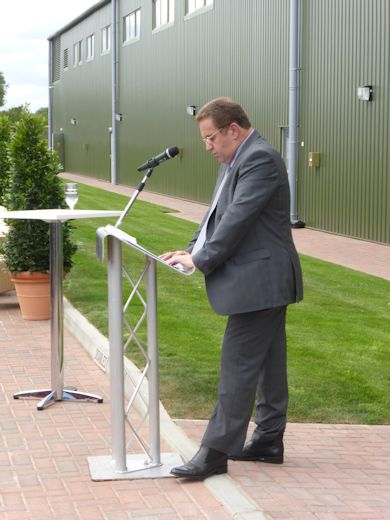 This is an entirely new project built on a 'greenfield site' after much discussion and consideration by the planning authority, it was agreed the site was the best option for the business and the local community. The alternative would have been to expand the operation at the former packing and storage site at Street Farm in a residential area of Lower Halling.
This is an entirely new project built on a 'greenfield site' after much discussion and consideration by the planning authority, it was agreed the site was the best option for the business and the local community. The alternative would have been to expand the operation at the former packing and storage site at Street Farm in a residential area of Lower Halling.
The new complex has a dedicated infrastructure keeping traffic away from the nearby residential areas, improving life for the local community. Flanders Farm will also produce circa 30 new jobs for local people, an important aspect of the planning decision.
The new facility is designed to accommodate an ambitious expansion by Goatham's. The business has grown exponentially over the last decade and will grow further with acquisitions of more land and an ambitious planting programme.
Clive Goatham reviewed the history of A.C.Goatham, how his father started the business in 1947 and projected into the future with plans for increasing top fruit volumes substantially by 2020. The acquisition of more land and a sustained planting programme will increase tonnages substantially, in addition the 20 'partner farms' supplying apples & pears to Goathams ensures a regular supply of fruit into the state of the art pack-house.
Clive emphasised the importance of support from Sainsbury; without that commitment Clive said the investment would not have taken place. 80% of the apples & pears passing through the storage and packing complex will be taken by Sainsburys with 20% going to Morrisons. An important element of the relationship between Goathams and the retailers is the 'direct supply' status.
Direct supply? When our industry was more fragmented, the need for a 'marketing desk' to manage the business relationship was a vital element. As the top fruit industry has polarised into a much smoother supply chain. The cost of running a pack-house has become prohibitive for the smaller growers, and as they have ceased to pack their own fruit, the services of large pack-house operations, usually on a larger farm within a group of growers has become the norm. In the last few years a new phenomenon has surfaced; the larger grower (by business - not physique) has taken on farms where a grower has decided to retire. Some have been on a long term lease basis and some sold to the expanding larger grower/packer.
Now the progression is towards Direct Supply and the likes of A.C.Goatham are one of the 'big players' among a few very large growing/storage/and packing operations. In addition to expanding the core business with more land under their ownership, Goathams have built a relationship with smaller growers adding more volume to their supply to Sainsbury and Morrison.
Around 200 members of the top fruit industry accepted invitations to attend the Grand Opening of A.C.Goatham & Sons new Headquarters which includes a state of the art pack-house and storage complex, costing £9,000,000.
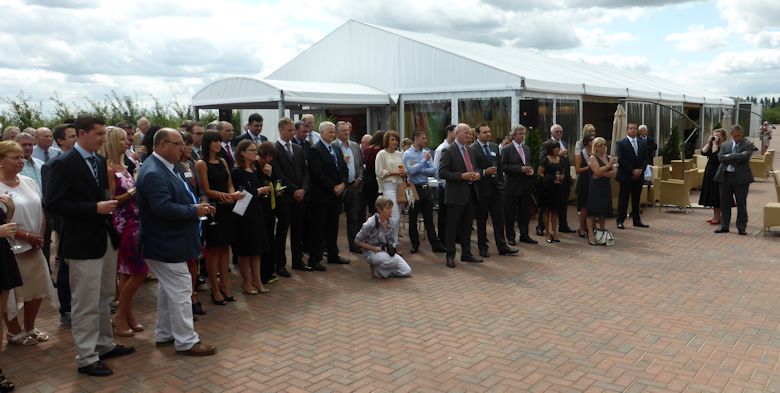
Clive thanked the many people involved in bringing this exceptional complex to fruition. He said to single out individuals would be wrong; "but I will mention three who have been integral to the success of Flanders Farm".
Sarah Calcutt has been very involved and also organised the opening day, right down to the most minute details. Ross Goatham presented Sarah with a beautiful bouquet and Nick Brandreth from Lambert & Foster who managed the whole process over the eight years leading up to completion received a special gift.
Dr. Theresa Huxley - Produce Technologist for Sainsburys has been an inspiration to all British Produce growers and has shown great support to Goathams Flander Farm venture. Theresa also received an identical gift.
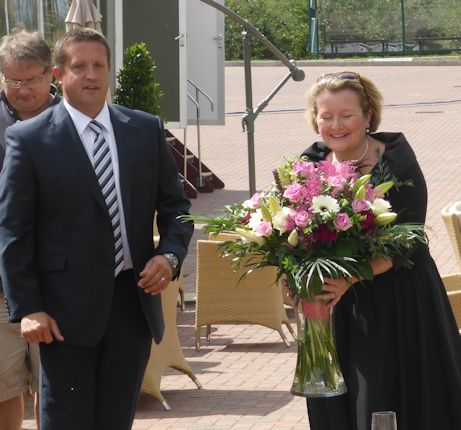
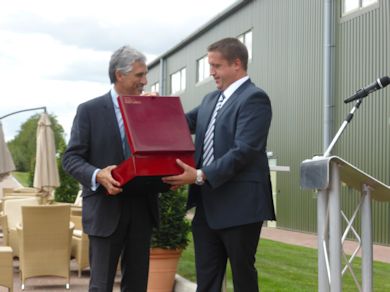
The importance of Sainsburys as a recipient of apples & pears from Goathams and the recognition by the retailer of the commitment shown by Goathams to the future of the English top fruit industry was demonstrated by Justin King, Sainsburys CEO performing the ceremonial Grand Opening of this fabulous new facility.
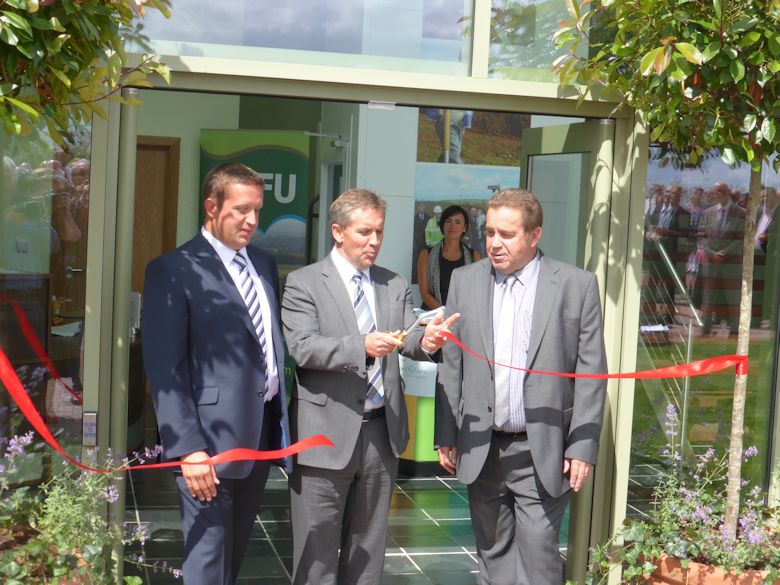
In the pack-house two grading & packing lines deliver flexibility; two six lane MAF Roda grading lines, one delivering 17.5 tonnes per hour and the second a 'joint' apple & pear line capable of 8 tonnes per hour output. The spectacular (calculated) output is designed to ensure the business is well placed to handle the increased volume from the extensive planting programme.
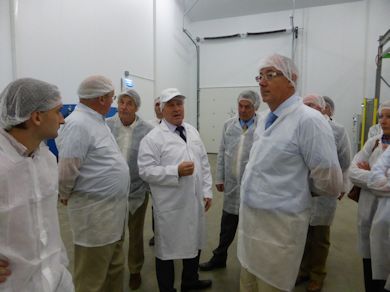
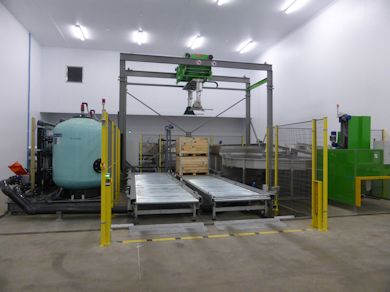
.jpg)
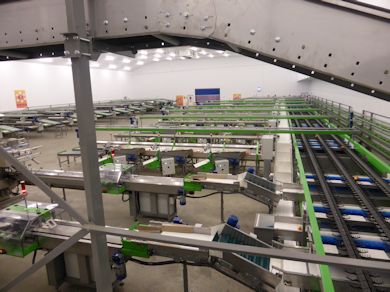
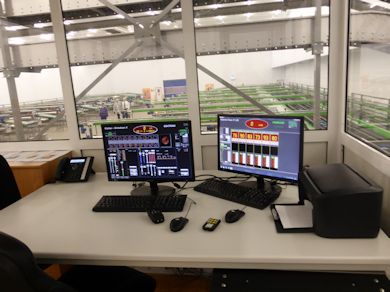
Earlier mention of extended thanks to Sarah Calcutt and Nick Brandreth included sincere thanks from Clive Goatham to Sainsburys Produce Technologist - Dr. Theresa Huxley who has done so much to support British Produce. Clive recognised Theresa's support with a complimentary gift, BUT, 'shy Theresa' gave us no chance of a picture when presented, so here is a nice picture (supplied by Sarah) of Justin King, Theresa Huxley and Lee Turner - Fruit Buyer for JS.
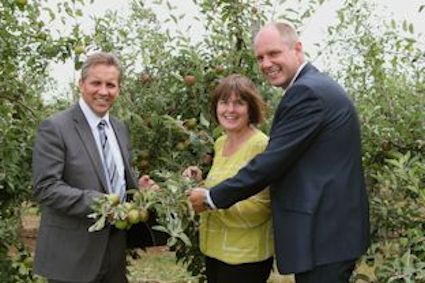
The English Apple Man in France!
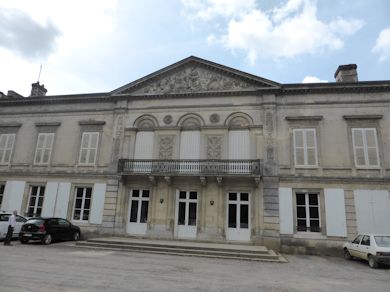 On Monday & Tuesday; 12th/13th August Peter Breach organised a visit to The Pépinières du Valois Nurseries at Château de Noue in Villers Cotterets some 70 KM East of Paris. Back in 1967 Peter's father John started a business relationship with Charles Andre, a remarkable grower and nurseryman as he built his orchards and nursery business into a major supplier of apples and trees.
On Monday & Tuesday; 12th/13th August Peter Breach organised a visit to The Pépinières du Valois Nurseries at Château de Noue in Villers Cotterets some 70 KM East of Paris. Back in 1967 Peter's father John started a business relationship with Charles Andre, a remarkable grower and nurseryman as he built his orchards and nursery business into a major supplier of apples and trees.
Leaving Kent on the 9am Shuttle The EAM and three friends arrived in Villers Cotterets at lunchtime. After a light lunch in the village centre we drove the short distance to the Headquarters of the Valois Nursery and met up with the remainder of the group organised by Peter.
We were met by Bruno Essner owner of the Pépinières du Valois and one of his senior technical staff, Frédéric Michaud. After initial introductions we moved to the meeting room where Bruno brought us up to date with the structural changes within the business.
Before updating us, Bruno said we have arrived at a very busy time; budding is in process and 100 people are working in the nursery, double the usual number.
Valois has been a very significant supplier of trees to the fruit growers across Europe for many years, but In June 2012, Pépinières du Valois and DL Davodeau Ligonnière, the Loire based Nursery, merged to form one group of companies.
The major benefits of the merger are a combined production of 4.5 million trees, more than 10% of the annual European nursery production of 40,000,000 and a stronger research unit.
In the Loire Valley a 20 hectare experimental orchard allows the development of new varieties bred in many associate breeding programmes across the World under the International Fruit Obtention (IFO)
Developing new rootstocks is a key role for the dedicated team in the partnership between members of IFO. The 3 key areas are; Climate, Commercial and Market attributes. Any new rootstock must deliver the potential to meet the Climatic challenges in all the growing regions of the World; wet, dry and cold. Likewise the ability to deliver a commercially successful product and a marketable fruit is essential.
Producing trees of consistent quality in the nursery requires production of high quality bud wood. Specific orchards for bud wood are key to consistency, new trees are produced by 'budding' in summer (August) and 'grafting' in Winter. 80% of trees are 'Knipboom' and 20% 'Maidens' an asset is the fact that French Certification is among the best in the World.
Far more than a tree nursery, Valois also owns 2 orchards (in Villers-Cotterêts and Seiches sur le Loir). These orchards are not only aimed to produce apples and pears. This activity enables Valois Nurseries to know the producers' needs and expectations.
Producers from all over the world are welcome to visit us and have the opportunity of discovering a large range of varieties.
The scale of the nursery production is seen below in just one of the nursery plantations. Valois only use land that has never been used for apple or pears before, ensuring the young trees have the best possible start in life!
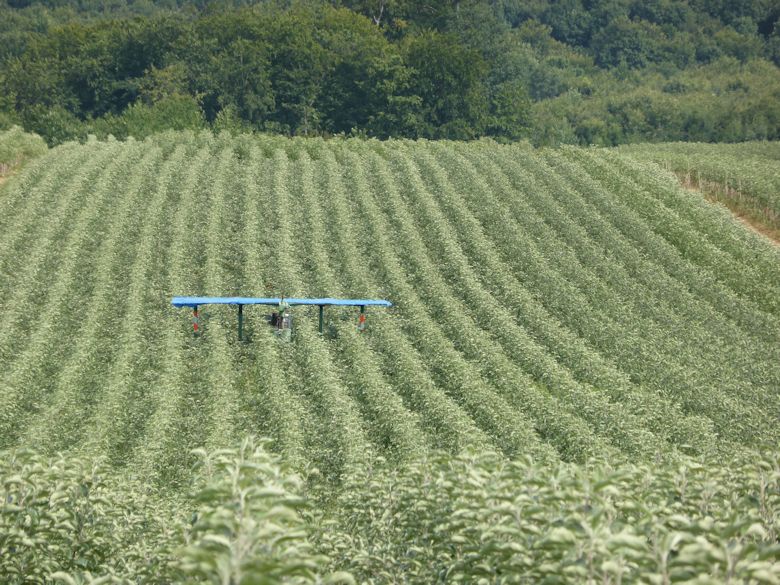
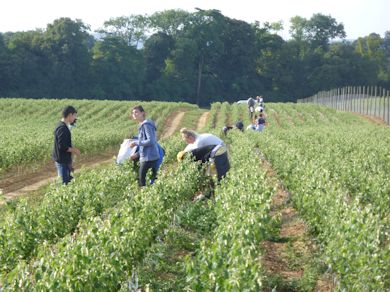
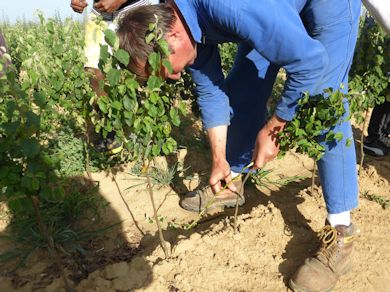
Bruno highlighted the M116 rootstock, is not susceptible to phytopthera.
Bruno gave us an overview of the newer varieties 'coming on stream' Jugala ann early Gala clone maturing 5-7 days before Gala. GALMAC; a Gala x Jerseymac cross which ripens 3 weeks before Gala. Crimson Crisp is one week before Gala; Lafayette - 10 - 15 days before Gala is a cross of Goldrush x Pristine is ghe earliest scab free yellow variety. Cheerfull Gold bred from a seed by John Breach has an acidic v sweet flavour and keeps very late, past the normal end for most English grown apples.
For a more detailed insight into the scale of Pépinières du Valois
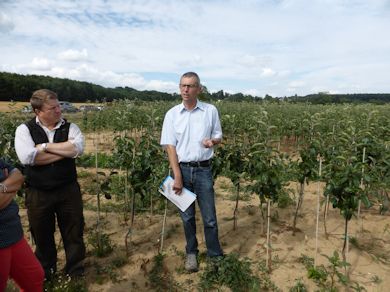
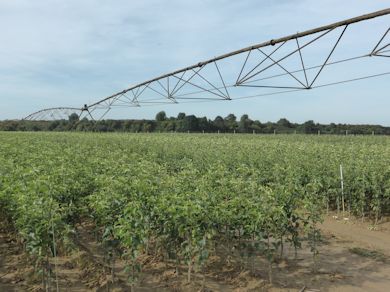
Visiting the trial orchards at Valois and in the production orchards we saw a number of new varieties. Several have yet to be released and reporting restrictions apply. However a very attractive new pear called Daciana caught the eye; sporting an attractive blush on a Conference shaped pear, it could well be a 'Winner' the Conference in the production orchard carry their customary 35 - 40 tonnes per hectare. Visiting a neighbouring farm concentrating on Cider orchards we saw a splendid 4 year old orchard carrying a good crop.
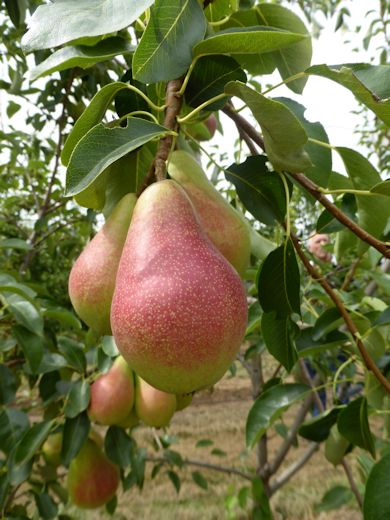
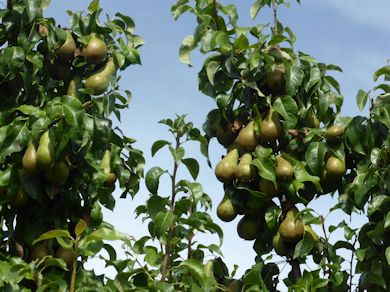
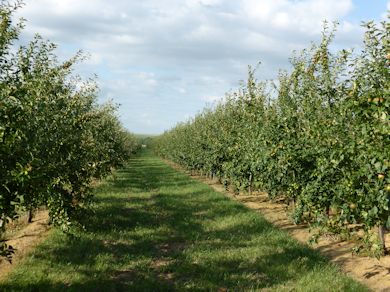
While there, the group posed for a picture (the EAM is behind the camera)
.jpg)
The 'finale' was a visit to The Mushroom Cellars under the production orchards at Valois. Created several hundred years ago, when the stone was cut out to build The Chateau and deserted since the late 1700's a resourceful Mushroom Farmer now owns the caves and produces a steady flow high of quality mushrooms.
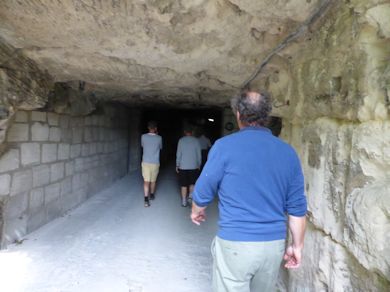
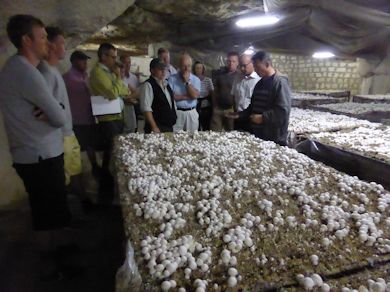
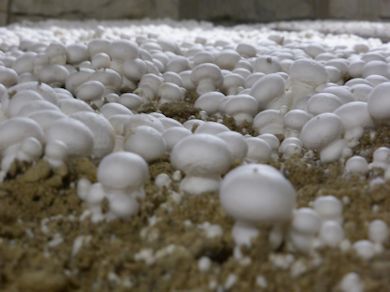
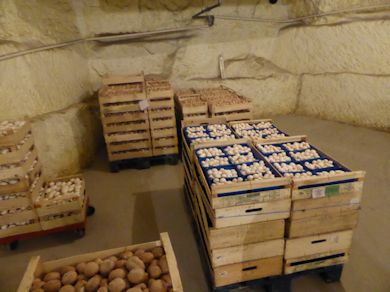
This was a fairly brief overview of our two days at Villers-Cotterêts and for readers of the Fruit Grower, The English Apple Man will be sending in a much more detailed review for publication in the September issue.
That is all for this week...............
Take care
The English Apple Man
PS:
See below a snippet picked up from the news service about English Melons.
Once grown only in the sun-drenched Mediterranean climate, melons are now arriving fresh from the fields of Britain.
Farmers in Kent and Staffordshire are about to deliver thousands of cantaloupes and galias to the major supermarkets.
They are using polytunnels in which strawberries are produced earlier in the year.
Most of the melons imported to the UK from Italy, Spain and southern France are harvested before they ripen and treated with chemicals to prevent them spoiling during transport.
By contrast, those grown in this country are picked when ripe and will be in the shops within a few days.
This suggests that they should be particularly tasty and healthy.
Marks & Spencer is about to take delivery of melons grown in Staffordshire.
The chain's fruit expert, Bill Davies, said: 'These British melons are a win-win fruit for our customers, who have delicious fruit, and our farmers who can reuse the valuable land that is left once the strawberry crop has finished.'
The Kent company Newmafruit, based near Canterbury, is harvesting its first crop of 5,000 cantaloupes this year.
They will be sold through Morrisons and Co-op stores, with hopes of expansion.
The company's managing director, Tony Frankham, said: 'The early indications are this has been very successful. The melons are looking absolutely fantastic.'
The fact that warm weather crops can now be grown in this country is seen as evidence of both improvements in farming techniques and a change in the climate.
The chalk slopes of southern Britain are producing excellent grapes and wine, while sweetcorn is grown on a significant scale as far north as Yorkshire.
M&S expects to receive five tons of British apricots, which would normally be grown in France, from a Kent farm.
Newmafruit Farms Ltd and Newmafruit International Ltd manage over 1300 acres of orchard and soft fruit production, with extensive warehousing, storage and packing facilities.
The company handles over 60,000 tonnes of product a year, the majority of which consists of 26 varieties of apple and six of pear, plus cherries, plums and soft fruit.
Source: DailyMailOnline
This year's weather has created the ideal conditions for a bumper crop of sweet and rosy apples, experts say.
The Royal Horticultural Society (RHS) said last year's wet autumn followed by the icy spring and a hot summer were perfect for apple growing.
Shoppers can expect to see the homegrown harvest appear in shops in the next few weeks, the RHS added.
Last year's apple orchards experienced a poor harvest after a cool and wet spring and summer.
Jim Arbury, fruit specialist at the RHS's Wisley garden in Surrey, said: "Apples evolved in central Asia to suit a continental climate of hot summers and very cold winters and need to be exposed to a certain amount of cold weather each winter or they won't flower or fruit properly."
He explained that the wet autumn in 2012 helped to rule out the chance of drought which can lead to small, poor-tasting fruit.
Chilly conditions right up until April gave the trees enough "chill time" for the fruit to set properly and held back flowering, he said.
By the time they did flower, there were more insects around to pollinate the blossom and less risk of damage by frost. Then very hot weather in summer boosted ripening, he added.
"In the spring crops were lagging up to a month behind but a sudden burst of sunshine in prime ripening season late June and July has helped the apples gain some ground as well as helping them ripen up beautifully," said Mr Arbury.
Source: BBC